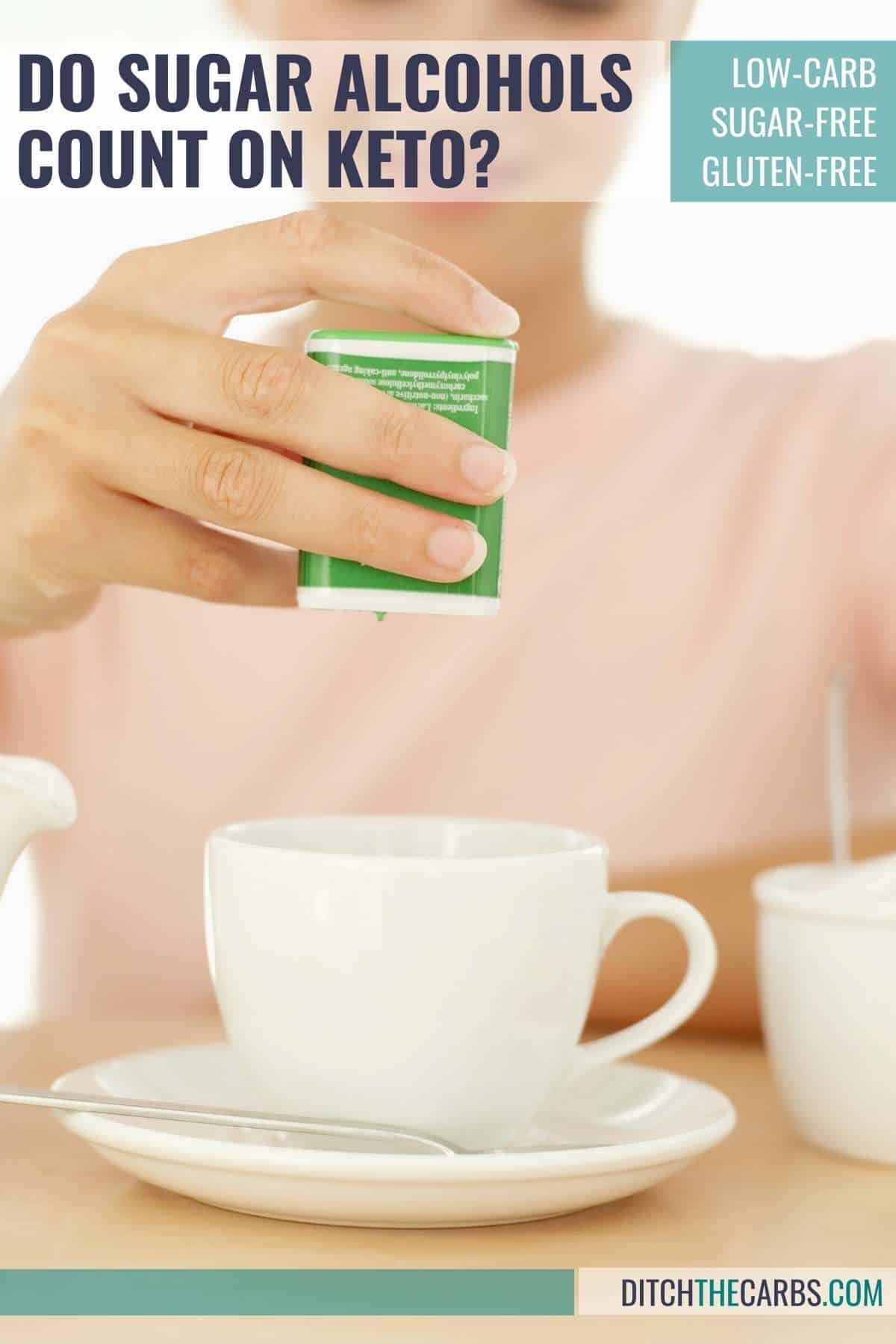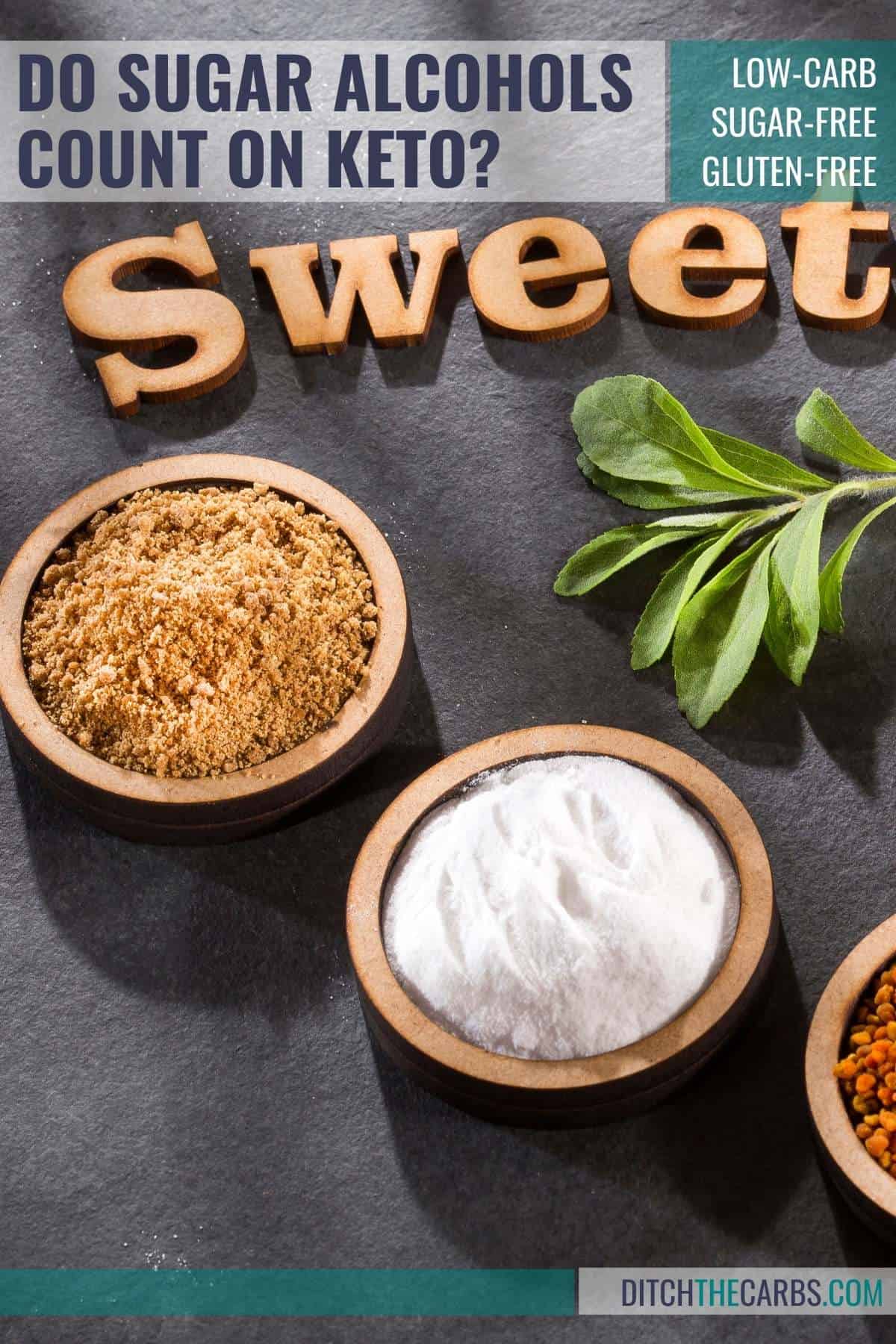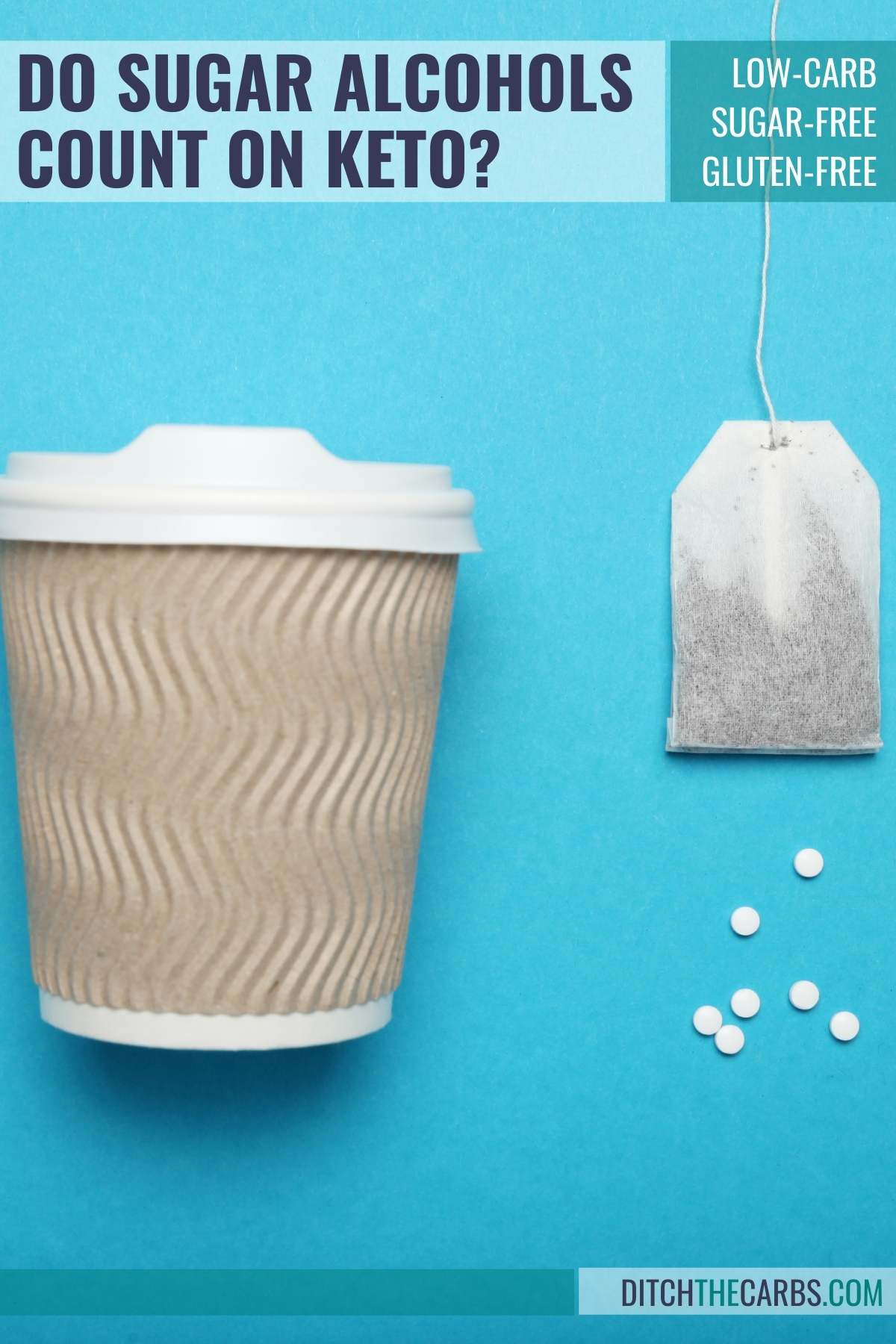If you’ve been watching what you eat on your ketogenic diet, you’ve likely encountered something with a sugar alcohol.
While I always advocate reducing sugar intake as much as possible, it’s unrealistic to think that sweet treats can be totally eradicated from your diet.
That’s where the use of sugar alcohols come in! They offer those who follow low-carb diets a great alternative to regular sugar such as table sugar which is known for its very high glycemic index, spiking blood glucose and insulin levels. And avoiding insulin resistance is one of the biggest health advantages of the keto diet.

If you want to enjoy the addition of sweetness in some of your foods, then using certain sugar alcohols is a great compromise. Read on further to learn what to use and more importantly, what to avoid.
Are you ready to create the ultimate 12-month blueprint for reaching your health & weight loss goals this coming year?

Our free on-demand video training will walk you through how to make 2024 THE year you set health goals…and keep them.
But do sugar alcohols count on keto? Yes, and no. Sugar alcohols have a much lower impact on blood sugar spikes due to them not being easily digestible. This makes them an ideal substitute for baking, cooking or selecting keto-friendly products in your local store.
What are sugar alcohols?
If you haven’t come across the term “sugar alcohols” before, they are naturally present in certain fruits as well as being man-made by processing regular sugars.
Although sweet like natural sugars, their molecular structure differs making sugar alcohols harder to absorb and digest. This is why they are lower in calories and therefore often added to foods that are marketed as “sugar-free” or “no sugar added”.
While added to food, they are also commonly found in other items such as sugar-free chewing gum, medications, laxatives, and toothpaste!
The common sugar alcohols that most of us are familiar with, especially when trying to find sugar alternatives, include:
- erythritol
- sorbitol
- maltitol
- mannitol
- xylitol
Two more common sugar replacements are stevia and monk fruit. These are NOT sugar alcohols. They are natural sweeteners made from plants. These common keto sweeteners are popular amongst those who have had digestive problems with sugar alcohol but still want sugar substitutes.
What are the benefits and risks of sugar alcohols?
Ever wondered what is the controversy regarding the use of sugar alcohols? When considering table sugar versus sugar alcohols for your keto or health goals, it makes sense to weigh up the benefits as well as the risks associated with them.
Do sugar alcohols count on keto and what are the top benefits and risks of sugar alcohols? These give you a good idea of why they are so popular with keto dieters.
Benefits of using sugar alcohols

- Due to not being easily absorbed, sugar alcohols are less calorie dense than sugar. Making them a great option for low-carb baking, cooking meals, and adding to drinks.
- They are usually less sweet which can be a great way to wean yourself off highly sweet foods.
- Sugar alcohols are not fermented by the bacteria in your mouth like other sugars are. This is important because fermentation causes an increase in acid that damages tooth enamel. Xylitol (for example), doesn’t contribute to tooth decay.
- Sugar alcohols are a better option for those who want to control their blood sugars. Especially those who are either prediabetic, T1D, T2D, or who suffer from metabolic syndrome.
Risks of using sugar alcohols

- Sugar alcohols are not well absorbed. If they are consumed in excess by those with digestive sensitivity. They may cause digestive issues such as bloating, diarrhea, flatulence, and stomach ache. These symptoms are similar to those who experience irritable bowel syndrome.
- Sugar alcohols may inhibit gut bacteria and so the health benefits of a wide range of healthy gut flora are reduced.
- There is a risk of overconsumption of sweet treats using sugar alcohols due to their lower calories and lower carbs. This is known as the “Snack Well effect”. This is when a dieter consumes more than they should because they think the snack is good for them. Dieters also may think sugar-free food is “free food”.
- It’s worth mentioning that some types of sugar alcohol are dangerous for animals. In particular, xylitol is lethal to dogs. Extra caution needs to be taken when using this ingredient in recipes or packaged foods containing it. ALWAYS keep it out of reach from your beloved pets. Make sure it’s not dropped on the ground for pets to lick up either!
Are sugar alcohols keto-friendly?
Following a keto diet means limiting sugar intake as the digestion of sugar increases blood sugar levels. This in turn negatively impacts the ability to remain in a state of ketosis (burning fat instead of carbohydrates for fuel).
As mentioned above, sugar alcohols have a different molecular structure than regular sugars. Sugar alcohols are less digestible which means that you’ll be ingesting fewer calories and carbs compared to regular table sugar.
It’s for this reason that most keto-friendly products and recipes contain and call for the use of sugar alcohols as a great substitute for regular sugar.
With this said, each sugar alcohol has a slightly different glycaemic index. It’s important to note as it means some will be a smarter option than others that may have higher GIs.
To illustrate this point, let’s have a quick look at some of the most common sugar alcohols. The table below shows their corresponding sweetness (table sugar being a value of 1), their GI values, and how many calories per gram of sweetener.
Sweeteners, sweetness, glycemic index, and calories.
| Sweetener | Sweetness (average) | Glycemic Index | Calories (per gram) |
|---|---|---|---|
| FRUCTOSE | 1.7 | 19-23 | 4 |
| GLUCOSE | 0.5 | 100 | 4 |
| LACTOSE (milk sugar) | 0.3 | 46 | 4 |
| SUCROSE (table sugar = glucose + fructose) | 1 | 61-65 | 4 |
| Erythritol | 0.7 | 0 | 0.2 |
| Isomalt | 0.5 | 2 | 2 |
| Maltitol | 0.7 | 35-52 | 3 |
| Mannitol | 0.6 | 0 | 1.6 |
| Sorbitol | 0.6 | 9 | 2.6 |
| Xylitol | 1 | 7-13 | 3 |
It’s clear that the best sugar alcohol to use is erythritol since it has a GI value of zero and it is almost as sweet as sugar.
Maltitol comes in last while still being lower than the GI value of regular table sugar (sucrose) which sits around 62.
While most sugar alcohols are indeed keto-friendly, it’s always advisable to stick with those listed here that have the lowest GI values. Added to that is the point that the low calories associated with these sugar alcohols should never be used as an excuse to overindulge. An excessive amount of anything is likely to tip you over your daily carb limit and kick you out of ketosis.
How do you count sugar alcohols?
It depends on:
- Which sugar alcohol do you use?
- How sensitive you are to sugar alcohol?
Sugar alcohols are still counted as total carbohydrates BUT since they are not fully digestible MOST people following the keto diet subtract the grams of sugar alcohols entirely. Similar to how you might deduct dietary fiber to get a net carb calculation. Whilst others deduct a certain percentage from the total carbohydrate count.
How do you know if you are sensitive to sugar alcohol?
The best way to tell if sugar alcohols raise your blood glucose is to test your blood sugars. Buying a blood sugar meter is probably the best $20-$40 you can ever spend.
As much as the literature and research show that many sugar alcohols, such as erythritol, have zero impact on blood sugars, anecdotally I have had hundreds of readers reach out to say it affects them.
Do you count net carbs for sugar alcohols?
Net carbs are essentially the total amount of digestible carbs which is why fiber is deducted from a total carb count in recipes and packaged foods. It’s important to understand how to read a food label, the ingredient list, and the nutrition panel.
It’s also important to note that the keto diet limits you to 20g net grams of carbs per day, not 20g of total grams of carbs. This is why it’s good to know how to count net carbs for sugar alcohols when reading a nutrition label.
While the total count of grams of fiber is subtracted from total carbs to reach a net carb count in packaged foods and recipes, many people subtract half of the grams of any sugar alcohols listed on food packages or listed in recipes from total carbs to get your net carb count. An exception to this rule is with respect to erythritol (if it’s the only sugar listed then its carbs can be completely subtracted from the total carb count).
One method that many readers use when needing to count net carbs for sugar alcohols from a food label:
Net Carbs = (total carbs – fiber) – ( 0.5 x sugar alcohol carbs) *except for erythritol
How much sugar alcohol is too much?

In the ideal world, we would only eat whole food that is nutrient-dense and does not spike our blood sugars. But I know this is not realistic for 99% of you reading this article.
For many readers, not being allowed a sweet treat every now and again is a deal-breaker. If I told you, you were never allowed a sweet treat ever again, you might not even contemplate starting your low-carb or keto diet.
So this is where non-nutritive sweeteners come in. It can be a compromise to allow you to enjoy occasional sweet treats, by using low-carb and keto recipes and sweeteners.
But … the long-term ethos of living low-carb or keto is to slowly give up the sweet treats, and low-carb keto baking. Base your meals and snacks on nutrient-dense savory foods instead.
Some people may be able to enjoy a few tablespoons each day, whilst others have a zero-tolerance and so avoid low-carb sweeteners completely.
How much sugar alcohol you can enjoy on your low-carb or keto diet will depend on the following:
- does your stomach become upset if you eat too much sugar alcohol?
- does your blood glucose rise with these sweeteners?
- is weight loss still occurring?
- has weight loss stopped?
Each one of these answers will dictate how much sugar alcohol you might wish to enjoy.
Do my recipes count sugar alcohol?
No.
My recipes are calculated using erythritol, which is not absorbed, so the carbs have been removed from the total carb count and net carb count.
However, as mentioned above, if you have discovered erythritol raises your blood glucose, you may need to add the erythritol carb value (that you used) to your daily carb intake limit.
In addition, my recipes always state the desired amount of sweetener “or more to your taste”.
If this is day 1 of sugar-free living for you, you may require twice the amount of sweetener as someone who has been living sugar-free for years. So don’t be afraid to add more sweetener.
The longer you live sugar-free, the less sweetener in time you will require. Your sweet tooth will slowly disappear and you will require only small amounts of a sugar substitute to give you a sweet taste.
TOP TIP: As with ALL recipes here, ALWAYS taste your batter BEFORE cooking to ensure you have added enough sweetener to suit YOUR tastebuds. Read the Ultimate Guide To Low-Carb Sweeteners.
What foods have sugar alcohols in them?

Some sugar alcohols are naturally present in fruits and vegetables while others are processed in labs.
In the instance of packaged processed foods, sugar alcohols are commonly found in the ingredient lists of sugar-free and diet products like chocolate, candy, ice cream, salad dressings, and protein bars/cookies, to name a few.
Sugar alcohols are also found in non-food items such as sugar-free chewing gum, toothpaste, certain medications, and laxatives!
And then, of course, these sugar alcohols are also available for home baking and cooking.
Sugar alcohols – The bottom line
Sugar alcohols have grown in popularity in their usage, especially alongside the low-carb and keto diet since they offer similar sweetness to table sugar but contain fewer calories due to being less digestible.
Regardless of their lower calorie count, they still have a carb count that needs to be factored in when ensuring that you keep within your total carbohydrate intake (limit) each day. You will also need to ascertain if you are able to enjoy, or need to avoid, sugar alcohol in large amounts. Maybe one type of sugar alcohol will suit you more than another.
After all, too much of anything is not good and it certainly doesn’t offer an excuse to overindulge in sweet treats simply because they offer a healthier alternative to table sugar!
Nevertheless, using sugar alcohols is a great alternative to other types of sugar that have high glycemic indexes and something you can use on the keto diet while trying to slowly wean yourself off sugary foods!
Try these keto-friendly no-sugar treats the whole family can enjoy!
- Sugar-free Flourless Chocolate Fudge Cake
- Keto Sugar-free Pavlova Recipe
- No-bake Sugar-free Mint Cheesecake

Get our FREE guide to finally fix your metabolism!
Losing weight & getting healthy is never easy, but lately you might feel like it’s suddenly become impossible.
Our Flip the Switch guide will help you clearly understand what’s been going on, as well as exactly what you can do to get your metabolism working again so that you can look and feel your best—it’s easier and more simple than you think!
















Very informative thanks! One Bit of advice to improve your writing, pay attention to grammar. Apostrophes denote possession not plural. You frequently write for example “other’s” Which would mean possession, as in the other’s houses. But what you really mean is plural as in all of the others. If you’re going to write it would be helpful to get your basic grammar and punctuation correct